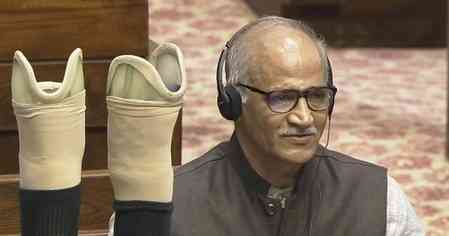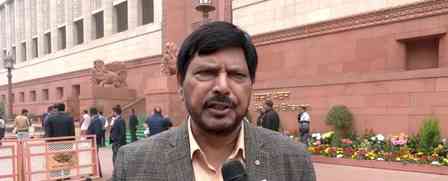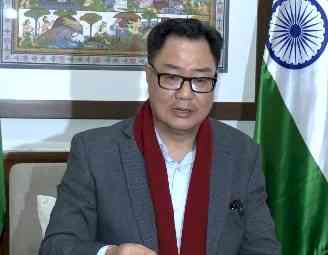'Prophylactic measures' more important than 'post-disaster action'
With the falling mercury signaling the arrival of an early winter, Kolkata is heading for its worst polluted period that will continue till the arrival of spring. Noted green technologist and environment activist, Somendra Mohan Ghosh says that preventive measures are more important that post-disaster actions to keep the Air Quality Index (AQI) from plummeting.

Sumanta Ray Chaudhuri
Kolkata, Nov 11 (IANS) With the falling mercury signaling the arrival of an early winter, Kolkata is heading for its worst polluted period that will continue till the arrival of spring. Noted green technologist and environment activist, Somendra Mohan Ghosh says that preventive measures are more important that post-disaster actions to keep the Air Quality Index (AQI) from plummeting.
Lamenting the lackadaisical approach of the enforcement agencies in adopting such preventive measures, Ghosh also suggested a host of steps to protect our lungs from being under siege not just during the worst polluted winter period but throughout the year.
In an interview with IANS, Ghosh elaborates his views on this count.
IANS: Kali Puja and Diwali are considered Kolkata's periodic gateway to the world of nightmarish AQI levels. Do you think that the situation will be the same this time as well or is there a chance of improvement?
SMG: The situation could have been different had the enforcement agencies cared to take the advice of environmentalists and green-technologists regarding precautionary measures. As you rightly said, the AQI levels start deteriorating from Kali Puja and Diwali onwards and they get worse during the peak of winter in December-January before improving with the advent of spring.
The AQI levels start getting worse from Kali Puja and Diwali, especially in Kolkata and in the major urban belts of West Bengal, because of the smoke and the pollutants emitted by the burning of firecrackers, apart from regular factors like vehicular pollution and burning of fossil fuel.
One easy solution to combat that was to clean the green belts in the city, especially the big trees there properly. These trees would have absorbed the pollutants being emitted and this would have resulted in lesser carbon in the air. But unfortunately, this simple precautionary measure was not adopted by the authorities concerned.
IANS: So when we speak of Green Crackers, how green are they really?
SMG: Any kind of cracker with sparklers emitting green-light is not really safe for our lungs because without the addition of barium such green sparkles are not possible. Now, such barium emission is not only harmful for our lungs but also can cause skin diseases and even cancer.
So the wrappers of such NEERI-certified green crackers should mandatorily contain the words 'Barium Free'. At the same time, the consumers should also be able to scan the QR codes on the wrappers and view the 'Barium Free' certificate given to them by NEERI.
IANS: Till now you were referring to seasonal pollution. What are your suggestions for year-long pollution, especially vehicular emissions?
SMG: The solution is not easy and nothing can be achieved overnight. My first suggestion is gradual replacement of diesel and petrol-driven vehicles with CNG or LPG-operated automobiles or even Electric Vehicles. Like all state-run transport corporations have started the process of shifting to EVs, private passenger bus operators should also be encouraged to do the same.
To achieve that, all the authorities concerned will have to take the initiative for smooth supply of CNG through a pipeline from Asansol in West Burdwan district. The number of centres for conversion of petrol/diesel-driven vehicles to LPG-driven ones should be increased within the city. At the same time, the number of gas refilling stations in the city should also be increased.
The entry of petrol/diesel-driven vehicles should be restricted in the city to the limited possible percentage of the total vehicles running within or entering Kolkata.
IANS: What is your take on the use of coal-ovens or kerosene stoves by food vendors in the streets of the city?
SMG: This is something that environmentalist and green technologists like us have been harping on for years. In Kolkata there are 10,000 street food vendors, so you can imagine the pollution emitted by these businesses.
Incidentally, an initiative was started by the current state government soon after it came to power, when the process of distribution of electric cookers started in the Salt Lake area. However, that stopped soon. Of the 10,000 street vendors only about 750 are operating with electric cookers and that, too, they are mainly restricted to the Salt Lake area on the northern outskirts of Kolkata. My suggestion is that the state government should immediately making provision for electric cookers for all street food vendors in Kolkata.
IANS: Do you think that the issue of sound pollution has somewhere remained neglected due to the focus on air pollution?
SMG: Undoubtedly, this issue is being neglected in West Bengal which is evident from the latest decision of the West Bengal Pollution Control Board (WBPCB) to relax the decibel limit for firecrackers from 90 to 125. The WBPCB misinterpreted the order of the Supreme Court while bringing this relaxation. The Board ignored the fact that while fixing the upper limit at 125 decibels, the apex court also gave a free hand to individual state agencies to fix their own lower limits. This was nothing but surrender to the firecracker lobby.


 IANS
IANS 










